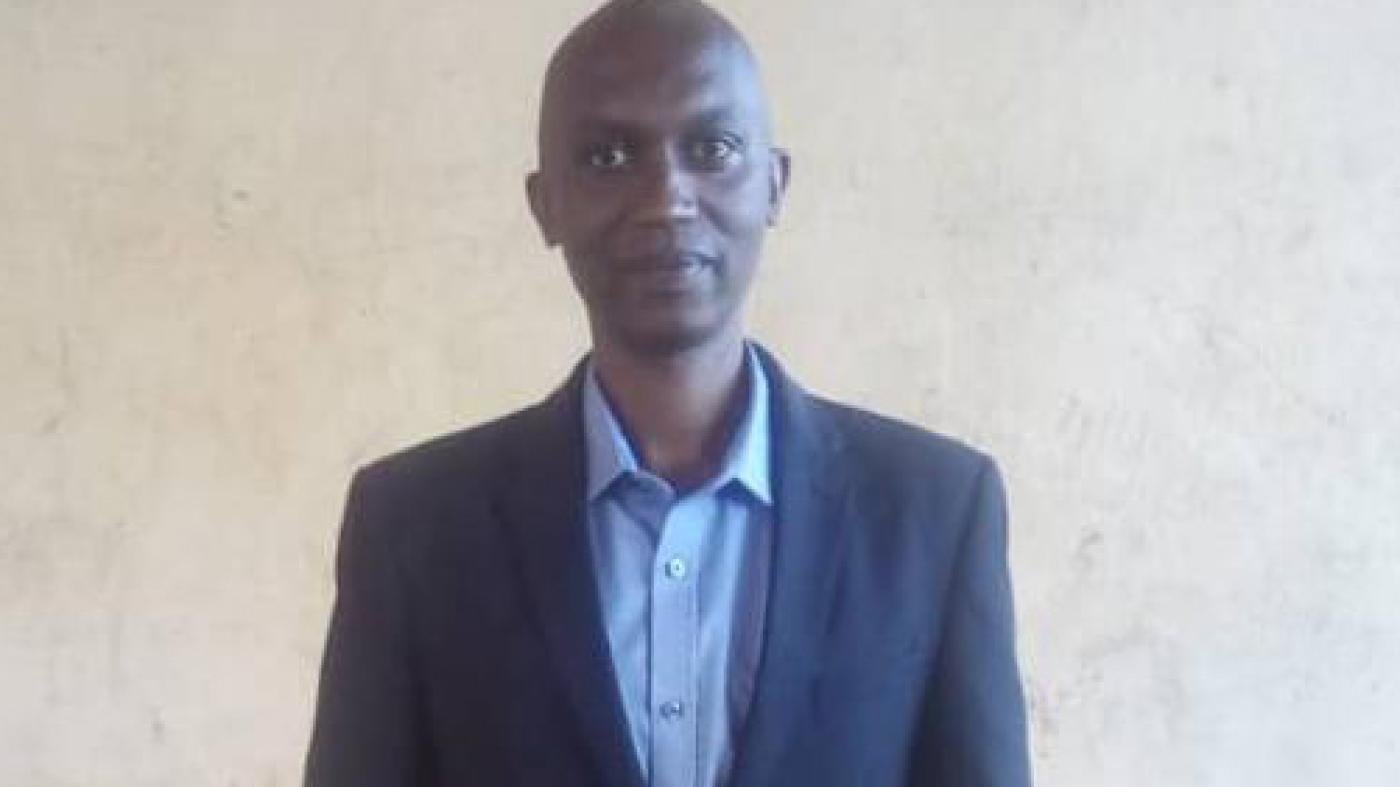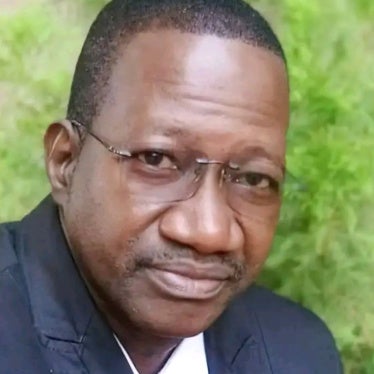How did you meet Nkina?
Tony is a lawyer who used to work with a group advocating for human rights and better prison conditions. We met in 2014 when I was researching abuses against human rights defenders and journalists for a regional organization.
Back then, Burundi had a vibrant civil society and human rights movement. The organization Tony represented in Kayanza province, the Association for the Protection of Human Rights and Detained Persons (Association pour la protection des droits humains et des personnes détenues, APRODH), was one of the most prominent human rights organizations in the country. Tony was a committed and principled human rights defender who cared deeply about helping the most vulnerable, especially in Burundi’s notoriously tough prisons.
When, in April 2015, Burundi’s former president, Pierre Nkurunziza, decided to run for a controversial third term despite a two-term limit set forth in the Arusha Accords – the peace agreement brokered at the end of a brutal civil war that left roughly 300,000 dead – independent nongovernmental organizations were at the forefront of organizing protests. Security forces responded with brutal force. Extrajudicial killings, arbitrary arrests, torture, and threats against those perceived to be political opponents became almost daily occurrences and plunged the country into a crisis of escalating violence and repression.
Most of the main independent civil society organizations, including APRODH, were suspended. Their bank accounts were frozen. Several human rights defenders were jailed, among them was one of Tony’s former colleagues who was arrested and sentenced to five years imprisonment for alleged state security offenses. The president of APRODH, Pierre Claver Mbonimpa, almost lost his life in an assassination attempt. Working as a human rights defender became too dangerous. Activists either fled into exile or went underground. After the suspension of APRODH in 2015, Tony ceased his human rights activities and only worked as a lawyer. But the worry that his past would catch up would always be there. Being associated with Burundi’s human rights movement can have severe repercussions.
Why was he arrested?
Tony was arrested in October 2020 while visiting an area in northern Burundi where rebel groups were active at the time. He had gone there to meet a client he was advising on a land dispute. In June 2021, Tony was found guilty by a provincial court of collaboration with armed groups, despite a lack of evidence. This is a common accusation against perceived opponents and critics in Burundi. He was subsequently sentenced to five years in prison.
In September 2021, an appeals court upheld the conviction, even though his lawyers showed he had visited the area for legitimate professional reasons, and despite prosecutors producing zero credible evidence that Tony was supporting a rebel group.
What signal did his arrest send?
Many hoped for change when Burundi’s new president, Évariste Ndayishimiye, came to power in June 2020, despite his previous position as secretary general of the very same party responsible for the brutal crackdown on critics and protestors under his predecessor. He had pledged to break with the country’s violent past, deliver “peace and justice for all”, and hold government officials to account for their crimes.
Tony’s arrest and conviction under the new president, however, reinforces the message that those associated with Burundi’s once vibrant human rights movement remain very much at risk of persecution.
Has there been any reckoning with Burundi’s repressive past?
As we know today, it was overly optimistic to think Ndayishimiye would or could implement reforms. Just this month, the president replaced the prime minister, Alain Guillaume Bunyoni, a hardliner who was until recently under US sanctions, with Gervais Ndirakobuca. Ndirakobuca, too, was sanctioned by the European Union and the United States for his alleged role in the 2015 crackdown.
The space for civil society and the media remains highly restricted, and those who are perceived to be critical of the government continue to face repression. For example, none of the life sentences issued in absentia in 2020 against leading human rights defenders and journalists in exile have been overturned.
Abuses by members of the ruling party’s notorious youth league, the Imbonerakure, have continued. People are targeted, arbitrarily arrested or forcibly disappeared, and at times tortured or killed for refusing to join the party or for being suspected of supporting the opposition or rebel groups. There is a breakdown in the rule of law, and no judicial independence.
Human Rights Watch has documented numerous rights abuses by Imbonerakure members in rural areas. In the country’s northwestern Cibitoke Province for example, which borders the Democratic Republic of the Congo, residents described a vicious crackdown against people suspected of opposing the Burundian government or aiding an armed opposition group that has attacked Burundian security forces, often without evidence. Since Ndayishimiye’s election, dead bodies, most unidentified and many mutilated, have turned up at an alarming rate in or around the river which runs between the two countries. In most cases, local authorities quickly bury them without investigation.
How is Nkina holding up in prison?
Tony is married and has four children. Conditions in Burundian prisons are tough. They are severely overcrowded, sanitation and hygiene are very bad, and life is generally more difficult for political prisoners.
The EU played a very important role in 2015 and 2016 in helping human rights defenders, pushing for their release. But since Ndayishimiye’s election, international partners have been far less vocal on human rights issues.
How does Burundi’s civil society feel about international efforts to normalize relations with the country?
Since Ndayishimiye came to power, his government has put a lot of effort into trying to get the sanctions and other measures lifted that the international community put in place in response to the human rights crisis under his predecessor. Successfully so. The EU has revoked restrictive financial measures under article 96 of the Cotonou Agreement to the government, the US has lifted all the sanctions imposed by the Obama administration, and the strongest human rights investigative mechanism that existed, the United Nations Commission of Inquiry, was not renewed.
Many Burundian human rights defenders feel quite betrayed by this rapprochement, which failed to take into account continuing human rights concerns in Burundi and the fact that many perpetrators continue to hold senior government positions. They also deplore the lack of public attention paid to ongoing human rights abuses that they and others are documenting. To many, the willingness of Washington and Brussels to trust the same officials who have overseen the killing, disappearance, and brutal torture of thousands of people since 2015 is inexplicable, as is their silence in the face of persistent human rights violations under Ndayishimiye.
What should Burundi’s international partners be doing instead?
Lifting international sanctions and other punitive measures in the absence of real progress on human rights or democratic reforms risks emboldening Burundi’s leaders to crack down even harder on their opponents. These steps have certainly not encouraged structural reform.
The United Nations Human Rights Council should renew the mandate of the UN Special Rapporteur on Burundi to ensure continued scrutiny. International partners, such as the African Union, the US, and the EU should publicly call out the Burundian government’s persistent human rights abuses and push for a restoration of the rule of law. Releasing Tony Germain Nkina and overturning the convictions in absentia of the group of human rights defenders and journalists in exile would be a good start. Ndayishimiye’s promises to respect human rights and reform the justice system cannot be taken seriously while Nkina remains in prison and while others fear to return home because of their past human rights activities.
*This interview has been edited and condensed.



